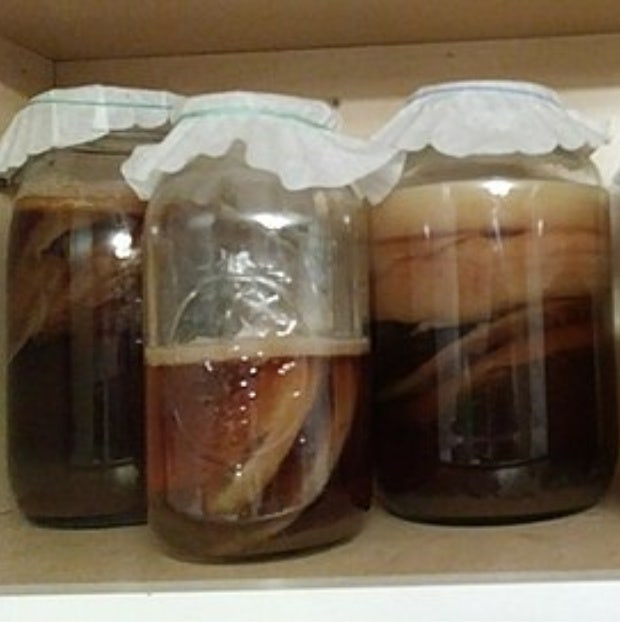Why Everyone & Their Mother Is Drinking Kombucha Tea (And You Probably Should, Too)
This is a trend you should definitely try.
 courtesy of the author
courtesy of the author Kombucha is a trendy yet traditional drink you've probably seen on shelves in the grocery store or heard your friends toss around in conversations, leaving you wondering what exactly it is.
What is kombucha?
In the simplest terms, kombucha is a fermented green or black tea with notes of vinegar and fizz believed to have originated thousands of years ago in China or Japan.
The ingredients listed on any bottle or recipe should be pretty simple: water, tea, sugar, and SCOBY.
Scoby (or SCOBAY) — an acronym for symbiotic culture of bacteria and yeast — is what makes kombucha kombucha.
It's a combination of bacteria and yeast used in many foods and beverages, including ginger beer, Jun (a drink similar to kombucha), kefir, sourdough bread, and vinegar. So, while kombucha is sometimes referred to as "mushroom tea," the mushroom in question refers to the colony of bacteria and yeast, not actual mushrooms.

Not only is it delicious, but there are many amazing health benefits of kombucha tea that can be gained from drinking this fizzy tea.
Many of kombucha's health benefits are believed to come from probiotics, described by WebMd as "live bacteria and yeasts that are good for you, especially your digestive system," which are what the scoby provides.
Other great benefits include, but aren't limited to:
- Antioxidant defense, to protect "your cells from damage caused by potentially harmful molecules known as free radicals"
- Protection against cancer: According to Joe Leech, an Austrailain dietitian with a Masters degree in nutrition and dietitian, "Kombucha helped prevent the growth and spread of cancerous cells due to its high concentration of tea polypheols and antioxidants." It is thought that polyphenols block gene mutation and growth of cancer cells while promoting cancer cell death. It is said that kombucha drinkers are less likely to develop various cancer types.
- Lower choloesterol and reduction of heart disease
- Boosted immunity
- Depression relief
- Weight loss (thanks to the green tea)
- Type 2 diabetes management
To get the full benefits of kombucha without any of the potential risks, it's important to choose from which brands you drink wisely.
There are many kombucha brands out there that are hopping into the trend, adding unnecessary ingredients. This is because of the vinegar taste, which they try to hide with added sugars.
When looking for the right brand of kombucha, look at the list ingredients first thing. You'll see that many contain fruit juices, adding unnecessary sugar. This will cause the kombucha to go from an average of 8 grams of sugar to 20 grams of sugar per bottle!
Two great brands for those who want to avoid excessive amounts of sugar are GTS Kombucha and Health-Ade Kombucha. These brands tend to stick more toward a natural kombucha, with both great flavor and low sugar.
On the other end of the spectrum, with great amounts of sugar in their kombucha are the versions from grocery chains like Safeway and Albertsons. Their kombucha contains a whopping 20 grams of sugar in a single serving (there are usually two servings in a bottle), so, yes, that's 40 grams of sugar.
It's also important to look for bottles that say the kombucha is unpasteurized.
Pasteurization is a process that uses mild heat to kill the live cultures, protecting against potential contamination and depleting the alcohol content.
According to chiropractic, certified doctor of natural medicine and clinical nutritionist, Dr. Josh Axe, "The bacteria killed during the pasteurization process is the same stuff that can help your gut function more efficiently. 'Pasteurized kombucha' should probably be called 'kombucha flavored tea' because the benefits of healthy bacteria have been lost during that process."
It might not always say unpasteurized, but you can also look for the word "raw."
And make sure probiotics are listed in the ingredients as well, because some companies take them out. There are usually a few billion in a single bottle of kombucha, which is great to include in your day.
Kombucha is a fermented tea, as you now know, so with that comes caffeine.
There is only a little caffeine in a bottle's serving — around 10-25 mgs — where a cup of coffee contains around 95 mgs. If you are watching your caffeine intake, keep an eye on that.
As for the subject of alcohol, kombucha is a fermented drink with yeast, just as beer is.
Kombucha, however, does not go through the exact same process, so the content of the alcohol isn't as high. You have to be 21 in most states to buy some, but not all, kombuchas. These usually come with a black label that says "21 and over," but some brands ferment their kombucha long enough that you don't have to be 21.
For example, one brand that ferments a little longer, causing a stronger alcohol content, is GTS Kombucha, which contains over 0.5 percent alcohol content and is considered a beer.
That's about all there is to know when picking out the right kombucha next time you're in the store staring at which one to get. Hopefully, you realize kombucha is actually a great, healthy fad to jump on, as long as you're buying the correct brand.
Go get a fizzy, fermented tea drink for yourself today, but don't forget to look at that ingredients list and sugar content!
Lachlan McKenzie is a freelance writer with a passion for healthy, delicious foods and clean living. Follow her on Instagram for more.
